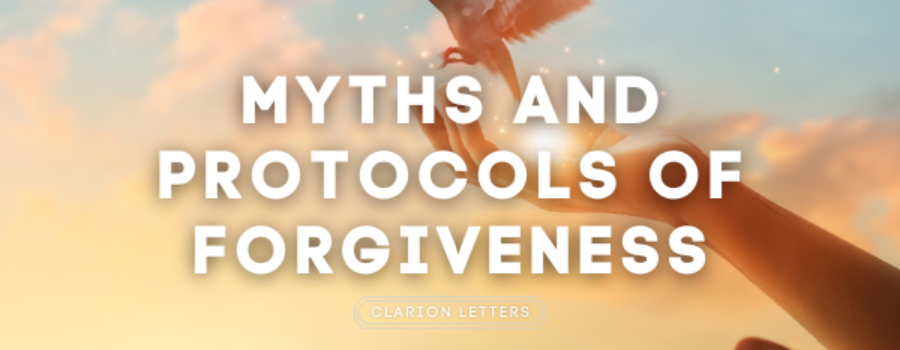Myths and Protocols of Forgiveness
(6 min read – 1055 words)
Forgiveness is the primary tool God uses to restore humanity to Himself, and humanity to each other. In the context of human relationships, there are two fundamental issues which need addressing. One, we may believe certain myths about forgiveness which may hold us back from extending it effectively. Two, the specific and actionable protocols one should take are often unclear. Let us deal with both issues today.
Let us look at three of the most common myths. Then, we will get into how one can forgive both practically and biblically.
Myth #1: To forgive is to forget – FALSE!
It is often believed that to forgive and forget go together like peas and carrots. That you cannot have one without the other. Nothing could be further from the truth! That we could somehow turn the switch off our memory banks and have some magical ability to recall certain events and not others are ludicrous. The reality is that you may always remember what happened. The difference however is that when those memories come to the forefront of your mind after you have released forgiveness, over time they will not carry with it the pain, emotional heaviness, and anger that was once attached to them.
Myth #2: Forgiveness means trust – FALSE!
Forgiveness does in no way mean that you are obligated to trust your offender again. I heard a story once of a woman who was being constantly abused by her husband, but she had falsely paired forgiveness with trust assuming it was her responsibility to extend both. After she had forgiven him, she continued to stay with him at the expense of becoming an ongoing human punching bag. She actually thought she was required to trust him because she had forgiven him, regardless of his actions. That is utter deception.
The bottom line is that it is the responsibility for the victim to extend forgiveness, but the responsibility of the wrongdoer to reestablish trust. To forgive does not mean automatic restoration of the relationship. In some cases, the relationship may never be restored. This is a harsh reality. Restoration should only happen when the wrongdoer has clearly and consistently demonstrated that they are worthy of your trust again. This burden is on them as the offender to reestablish trust, not you as the victim!
Myth #3: I cannot forgive because I don’t feel like it – FALSE!
This last myth is the most popular – that forgiveness is a feeling. Even at our highest points of anger and rage God asks us to forgive. How can this be? Because forgiveness, like love, is a choice not a feeling. Once one chooses to forgive, the charged emotions from the situation may continue to linger on for some time. The important thing however is that you made the choice! Sometimes however, some offenses are so severe and hurtful that we cannot seem to find the grace necessary to forgive. In these situations, we should go boldly before God’s throne and ask for grace to help us forgive the wrongdoer, and He will be faithful to give it every time. In these times we learn to forgive others with the forgiveness of God.
Forgiveness carries with it high costs. It costs us our pride, our right to control, and our right to be angry. Once we settle in our hearts however that the benefits of forgiveness outweigh the costs, we are at the right starting point.
What is true forgiveness?
As discussed, forgiveness does not mean you forget, you trust, nor is it some euphoric feeling. It is the exercising of the will to release the right to be offended or hold against. In the case of money, forgiveness means to grant relief from a payment due.
It has been once said that unforgiveness is like drinking poison and expecting the other person to die. Harboring unforgiveness in the long term can lead to serious emotional, spiritual, and even physical problems. For those that have received forgiveness of sins from God through faith in Christ Jesus, there is an expectation to give it away. Freely we have received it, freely we give it.
So how do I know I have effectively forgiven someone?
Here is where get into the practical nuts and bolts of forgiveness. Here are four steps to take:
Step 1- Confirm the facts. The first step in extending forgiveness is confirming the reality of the situation. Did what you think happened actually happen? How do you know that your perception of the situation is not polluted and that there truly is a genuine offense to be forgiven of?
Step 2- State the offense and the results of the offense. Once you have established the facts, every wrongful element should be specified either to yourself or to the other person (ideally). Then you should state how it personally affected you (the results).
As a lighthearted example:
The offense: “You drank my coffee. You know I need my coffee in the morning”.
The results of the offense: “This made me very angry!”
Step 3- Extend forgiveness. Here we are going back full circle to the main topic. This step also requires verbalization. Using our example above, this may look like this:
The offense: “You drank my coffee. You know I need my coffee in the morning”.
The results of the offense: “This made me very angry!”
The extension of forgiveness: “However, I love you and I forgive you for drinking my coffee. I release my right to be angry at you.”
Step 4- Bless! You may be surprised to know that forgiveness is not the end goal, but rather is a gate we go through to bless others. Therefore, the last step in the process is sincerely blessing the other person that offended you. This may be an act and/or in words.
The offense: “You drank my coffee. You know I need my coffee in the morning.”
The results of the offense: “This made me very angry!”
The extension of forgiveness: “However, I love you and I forgive you for drinking my coffee which I made for me. I release my right to be angry with you.”
And finally:
The blessing: “Furthermore, I pray that you will have a great day. Actually, here’s another cup of coffee and a kiss to get you started on the right foot!”








